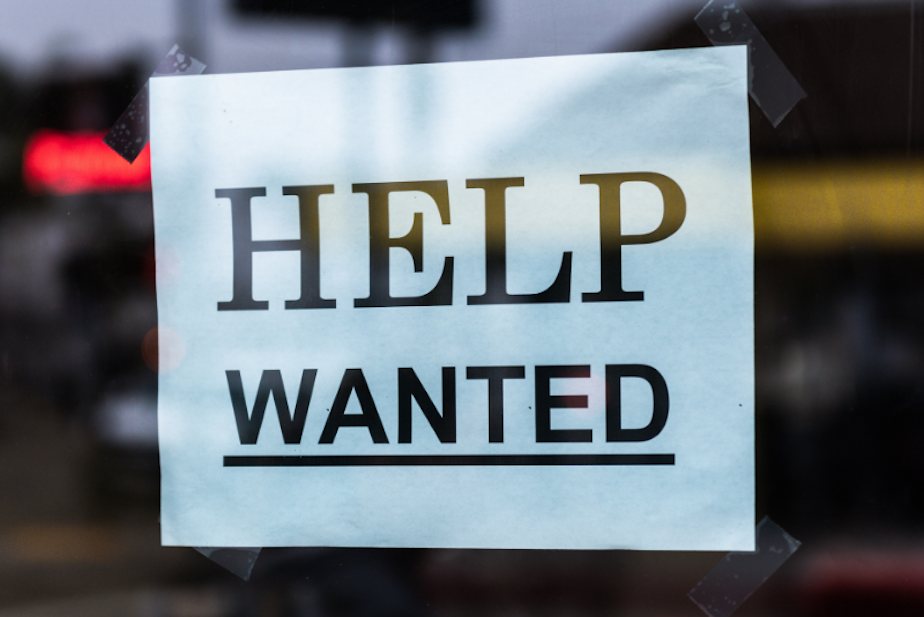How can we get workers to stay?: Today So Far

- Parents, teachers, and students in Seattle's south area have been trying a new way to fund their schools.
- Among all the conversations about our region's problems with addiction and drugs, have you heard the term “contingency management"?
- How can we get workers back? How can we get them to stay?
This post originally appeared in KUOW's Today So Far newsletter for April 19, 2023.
How can we get workers back? How can we get them to stay? These are questions we have heard again and again, ever since the pandemic struck.
KUOW's Monica Nickelsburg takes on these questions this week, while talking with a few folks from our area in the education, restaurant, and health care industries. A lot of contributing issues are not new, and this story notes that people have been leaving such industries since 2009. The pandemic, however, really made a mess of things and folks left in much greater numbers.
I'm going to offer some sobering truth, and understanding, to employers out there, pondering how to get and hold onto workers. I get it. The world changed, seemingly overnight. Inflation is now layered on top of the fact that our cities are largely unaffordable (they were before the pandemic). So you need workers, but they're going to have to commute from as far as Enumclaw. This is tough to hear, but nobody is doing you any favors telling you otherwise — you're just gonna have to pay more. Still, this is just one issue that Nickelsburg points to in her story this week. Read that here.
Among all the conversations about our region's problems with addiction and drugs, have you heard the term “contingency management"? It's a term you're likely to hear more often now that Seattle Mayor Bruce Harrell has approved a new approach to this issue. In short, it offers gift cards, prizes, and even cash to folks who continue to pass drug tests. Pass a test, get a prize, stay sober.
In Seattle, the new program will be run by Plymouth Housing. Money for it is coming from a $800,000 grant from the Washington State Health Care Authority.
“It is a method of incentivizing sobriety, or not using, so that people can get out of the crisis that they're in, and then seek or be open to long-term treatment,” said Seattle Councilmember Sara Nelson.
KUOW's David Hyde has the full story here.
Parents, teachers, and students in Seattle's south area have been trying a new way to fund their schools.
"Traditional PTAs are really focused on the school they are raising money for," Alaron Lewis with the Southeast Seattle Schools Fundraising Alliance told Seattle Now this morning. "So each PTA raises money for their own school, and ... between schools, we see huge differences. There are Title I schools, even up in the north end, that don't raise a tenth of what their neighboring school raises. So you may have one school that is funding multiple teachers off of their PTSA, and the neighboring school doesn't have enough money for a field trip."
For fourth grade teacher JC Fretz, it's not necessarily about funding teachers and field trips (though, those things are quite nice). Fretz teaches at Emerson Elementary and likes to include student input in how PTA money is spent. A top priority for his students — food. The kids don't have enough food.
"I still have to make choices of who gets a snack, who doesn't get a snack," Fretz said. "Because I don't have enough to pass out to everyone. Sometimes, it's trying to decide who seems most hungry today, who missed breakfast, who is having a hard time."
Seattle Now has the full story on this. Check it out here.
AS SEEN ON KUOW

The M/V Walla Walla is towed away at high tide around midnight, April 16, 2023 after the ferry boat ran aground at south Bainbridge Island. The Washington State Ferry fleet consists of 21 boats, 19 of which are in use when the ferry system is at peak service during the summer. Two boats are always out for maintenance. This leaves thin margins for error. There are challenges to building new boats, which Soundside discussed this week. (Coast Guard)
DID YOU KNOW?
Captain Picard has been my captain ever since he took command of the Enterprise D in 1987. It's odd to think that this major pop culture hero almost never happened. I relay this story as it was told to me by Patrick Stewart ... and a room full of other fans, but I like to think he told it to just me over a cup of Yorkshire Gold tea. In the 1980s, Stewart had a few film credits, but he was a theatre actor at heart. His manager, however, got him an audition for this new sci-fi show in LA. He was hesitant, because he heard that Hollywood liked to sign actors to six-year long contracts, just in case a show was successful. Stewart was planning for upcoming theatre seasons and didn't want TV acting to get in the way. He was then told something like this: "This show is a 'Star Trek' reboot, it's not going to be successful. You're just going to get a quick paycheck, meet some people, network, but there's no way this show is going past one season." So Stewart went along with it.
There was a divide among producers of "Star Trek: The Next Generation" when they were putting the show together. Some wanted a new version of Captain Kirk, with a beard, who could lose his shirt while fighting alien monsters with his bare fists each week. Others wanted a more refined, classic sea captain archetype. Both visions had one thing in common: the captain wasn't bald. So when Stewart walked in to audition, his head was the first thing they noticed. The actor had been bald for many years at that point. The audition actually went well. They wanted to see more of him (though some were still holding out for a sexy bearded space hunk), but they wanted to see him with hair. Stewart was a professional actor, who knew how to look the part. He had wigs and toupées at his home in London. Paramount Studios paid someone to break into Stewart's apartment, find a toupée, and fly it to LA. Stewart auditioned again, with hair, and won the role. Though after all that, as the show began to take shape, show creators said, "Ya know what? Forget the hair, we don't need it."
It turns out, Stewart received pretty bad advice about how poorly the show would perform. "Star Trek: The Next Generation" ran for seven seasons, and made four films. It set up a new era for the franchise, and ended up being one of the most intelligent and entertaining shows on TV. Now, 36 years later, we are about to finish season three of "Star Trek: Picard" this Thursday. If you haven't been watching "Picard" ... why?! What's wrong with you?
ALSO ON OUR MINDS

As schools face calls to drop Native American mascots, some could lose state money
While public backlash against Native American stereotypes has pushed professional sports teams in Washington, D.C., and Cleveland, Ohio, to change their names, there remain countless high schools across the U.S. that continue to use Native American-themed mascots and logos. While some states have moved to ban such imagery outright, calling it offensive and out of touch, efforts to do so have also met intense resistance by supporters who say the team names are central to the traditions and identity of their communities.

